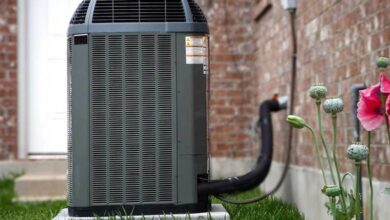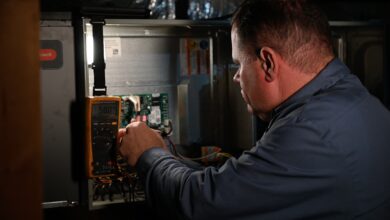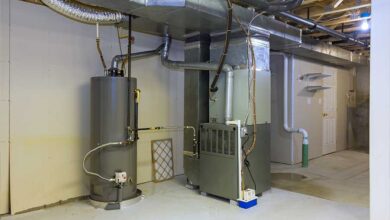9 Quick Fixes That Work

When your AC compressor not kicking on becomes the reality during a hot summer day, your comfort and sanity can quickly start to melt. The compressor is the heart of your air conditioning system. If it’s not working, your AC can’t cool your home. Whether you’re dealing with a central air conditioner, a split unit, or a window system, a compressor that fails to activate is a serious issue. This article covers the most common causes, essential troubleshooting steps, and smart solutions to fix your AC compressor not kicking on issue, fast.
Why Is My AC Compressor Not Kicking On?
Your AC compressor not kicking on could be caused by a variety of mechanical, electrical, or environmental problems. The compressor itself may not be faulty, but rather a component that supports its operation. These issues often involve the capacitor, contactor, thermostat, circuit breaker, or even the outdoor temperature sensor. Understanding where the failure lies is key to getting your system back on track.
Signs of an AC Compressor Not Kicking On Issue
Before diving into solutions, it helps to confirm that you’re really facing a AC compressor not kicking on scenario. Common signs include warm air blowing from vents, the outdoor unit running without the compressor turning on, strange clicking noises, or the fan operating while the air remains hot. These symptoms point directly to compressor activation failure.
How to Fix an AC Compressor Not Kicking On Issue
1. Check the Thermostat Settings First
One of the simplest reasons for an AC compressor not kicking on is incorrect thermostat settings. If the thermostat is set to Fan or On instead of Cool or Auto, the compressor won’t be signaled to start. Also, ensure the temperature is set lower than the current room temperature.
2. Inspect the Circuit Breaker
Power issues are a common culprit behind the AC compressor not kicking on . A tripped circuit breaker can cut power to the outdoor unit or compressor. Check your electrical panel and reset any tripped breakers. If the breaker keeps tripping, there’s likely a deeper electrical issue that needs professional attention.
3. Examine the Capacitor
A weak or faulty capacitor can cause an AC compressor not kicking on situation because it can’t supply the necessary jolt of electricity to start the compressor. A swollen or leaking capacitor is an obvious red flag. Replacing the capacitor often brings the compressor back to life.
4. Check the Contactor Relay
The contactor relay delivers power to the compressor and fan. If it becomes worn or pitted, it may not close the circuit properly, leading to the AC compressor not kicking on problem. You can inspect it visually and replace it if needed to restore normal operation.
5. Examine the Start Relay and Overload Protector
On some AC models, especially window units and older central systems, the compressor depends on a start relay and overload protector. If these components fail, you’ll likely find the AC compressor not kicking on when the system calls for cooling. Testing with a multimeter can confirm the issue.
6. Look for Low Refrigerant Levels
Low refrigerant can prevent the compressor from turning on, as modern systems include a pressure switch that disables the compressor under low, pressure conditions. If your AC compressor not kicking on is tied to this, you’ll need a certified technician to recharge the refrigerant and repair any leaks.
7. Inspect the Outdoor Unit for Debris
A dirty or clogged outdoor condenser unit can overheat the system, causing a thermal overload that prevents the AC compressor not kicking on . Clean the coils and remove any leaves or debris that might be obstructing airflow to help reset the system.
8. Test the Compressor for Continuity
If you’ve ruled out all other components and still face a AC compressor not kicking on , it’s time to test the compressor itself. Using a multimeter, check for continuity in the compressor’s windings. If there’s an open circuit or grounded winding, the compressor may need replacement.
9. Call a Licensed HVAC Technician
If you’ve gone through all the troubleshooting steps and your AC compressor not kicking on remains unresolved, it’s time to call in the pros. A certified HVAC technician has the tools, training, and parts to diagnose complex problems and get your system running safely and efficiently.
Preventing a Future AC Compressor Not Kicking On Situation
Schedule Seasonal Maintenance
The best way to prevent the dreaded AC compressor not kicking on issue is regular maintenance. Scheduling a professional tune, up in spring and fall ensures your system is clean, lubricated, and free from worn, out components.
Replace Filters Regularly
Clogged air filters can restrict airflow and cause overheating, indirectly resulting in your AC compressor not kicking on due to overload protection triggering. Change filters every 30 to 90 days depending on usage and environment.
Monitor System Performance
Stay alert to changes in cooling performance, unusual noises, or increased energy bills. These may be early warnings of components wearing out and a AC compressor not kicking on in the near future.
Keep the Outdoor Unit Clean
Regularly clean the outdoor condenser unit. Remove grass clippings, dirt, and leaves that block airflow and lead to overheating or your AC compressor not kicking on due to safety shutdowns.
Dangers of Ignoring an AC Compressor Not Kicking On Problem
When your AC compressor not kicking on isn’t addressed promptly, the consequences can pile up quickly. First, you’re stuck without cool air, which can be dangerous in high heat. Second, trying to run the system under these conditions puts strain on other components like the fan, capacitor, and wiring, potentially leading to further damage. Lastly, you may end up needing an entirely new AC system instead of just a simple repair if the issue snowballs.
Cost to Repair an AC Compressor Not Kicking On
Repairing a AC compressor not kicking on can vary widely in cost. A simple fix like replacing a capacitor or contactor might cost $150 or less. However, if the compressor itself is faulty and out of warranty, replacement can range from $1,200 to $2,500. Prompt diagnosis and repair can help you avoid unnecessary costs and keep your cooling system efficient.
When to Replace Your AC Instead of Repairing
If your system is over 10 years old and facing recurring AC compressor not kicking on issues, replacing it might be more cost, effective. Frequent breakdowns and declining efficiency are signs that the unit is nearing the end of its lifespan. Investing in a modern, energy, efficient model can save money long, term and provide more reliable cooling.
Conclusion
When your AC compressor not kicking on is the issue, every moment counts. The heat doesn’t wait, and neither should you. From electrical problems to mechanical failures, there are many reasons this critical part of your air conditioning system might fail. By following the right steps, from thermostat checks to component testing, you can often solve the issue yourself. But if all else fails, don’t hesitate to contact a licensed HVAC technician. Fast action can prevent discomfort, save money, and extend the life of your AC system.
FAQs
Q1: What causes an AC compressor not to kick on?
An AC compressor not kicking on is usually caused by a bad capacitor, contactor failure, thermostat issues, low refrigerant, or electrical problems.
Q2: Can I fix an AC compressor that won’t turn on myself?
In many cases, yes. Issues like a tripped breaker or bad capacitor can be resolved by homeowners. But more complex problems need professional repair.
Q3: How do I know if my compressor is bad or just the capacitor?
If the AC compressor is not kicking on and the capacitor looks swollen or leaky, it’s likely the capacitor. A multimeter test can confirm.
Q4: Is it expensive to fix a compressor that won’t start?
Fixing a AC compressor not kicking on can cost anywhere from $100 for simple repairs to over $2,000 if the compressor must be replaced.
Q5: Should I replace my AC unit if the compressor fails?
If your system is over 10 years old and the AC compressor not kicking on repeatedly, replacing the entire unit might be more cost, effective.
Do you have questions, or are you ready to start your next project? Explore our services at AiRCO Mechanical!




